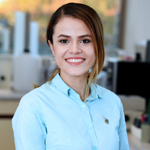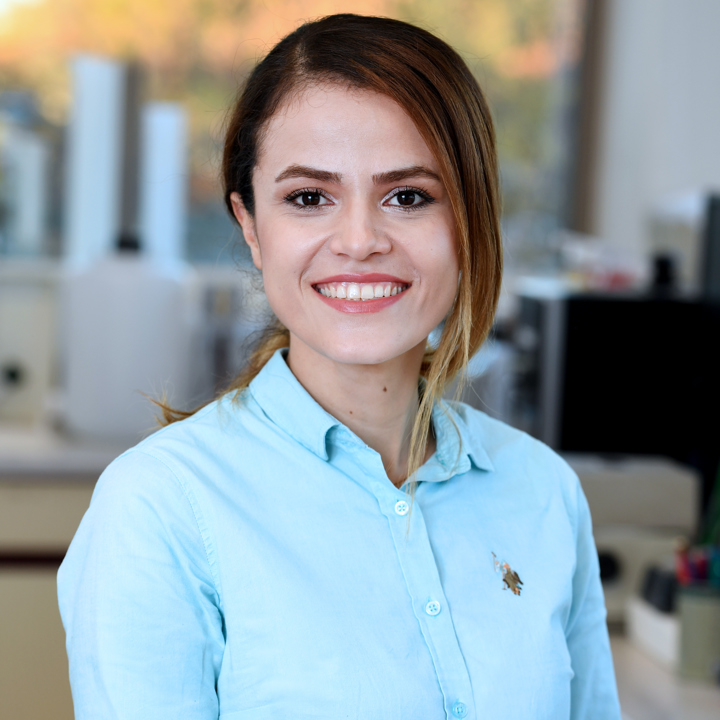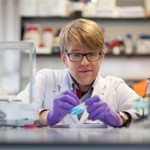
Research Area III - Energy and Metabolism
Research Area III covers the broad areas of mitochondria, membrane transport, metabolic pathways and networks, photosynthesis, free radicals, microbial bioenergetics and metabolism, electron transfer proteins, metabolism and metabolic diseases and metals in biology.
Get involved!
Research Area III - Energy and Metabolism
5 members

Jamie Blaza
Jamie Blaza
Jamie is interested in how electron and proton transfer reactions power all life, with a particular focus on bacterial bioenergetics and new drugs against TB. He is a biophysicist using both structural and functional methods to translate our increasingly detailed understanding of how bioenergetics works in vitro to living cells.
Keywords: Biophysics, Structural Biology, Bioenergetics, Enzymology, Metabolism, Microbiology, Biochemical techniques & resources, Biotechnology, Instrumentation & Devices, Cell Membranes, Excitation & Transport

Sara Anjomani-Virmouni
Sara Anjomani-Virmouni

Dr Anjomani has a long-standing interest in cellular and molecular genetic studies of the inherited neurodegenerative disorder, Friedreich’s ataxia (FRDA), contributing over the last 12 years to the development of GAA repeat-based FRDA transgenic mouse models for the investigation of FRDA disease pathogenesis and therapy. Her current research aims to understand metabolic signatures of FRDA with the view of providing novel therapeutic strategies for FRDA patient diagnosis and treatment through targeting their unique metabolism. She also has particular interest in studying iron biology and oxidative stress and has recently established multidisciplinary collaboration to assess the efficacy of smart molecules with iron chelation and/or antioxidant capacity in iron-related disorders.
Keywords: Neurodegeneration, Ataxia, Genetics, Genomics, Epigenetics, Cell Biology, Cellular Signalling, Mitochondrial Function, Metabolism, Oxidative Stress, Transgenic Mouse Models

Volker Behrends
Volker Behrends
Volker Behrends received his first degree in Biology from the University of Göttingen in Germany, a MRes in Biomedical Research and a PhD in Microbial Metabolism from Imperial College, London. His PhD focussed on metabolic in Pseudomonas aeruginosa during infections of the cystic fibrosis lung. As a postdoctoral research associate he continued his work on P. aeruginosa metabolism and investigated the different ways bacteria react to changes in nutrient availability. In 2014, he became a Lecturer in Biomedical Science at the University of Roehampton, where he is currently programme lead for Biological Science and Zoology. His research focuses on bacteria of the ESKAPE group of opportunistic pathogens, and the role metabolism plays in their virulence and resistance.
Keywords: Mass spectrometry, bacterial metabolism, ESKAPE

Michael Dodd
Michael Dodd

Mike is dedicated to exploring the intricate link between type 2 diabetes and cardiovascular disease, two conditions that account for a significant portion, nearly one-tenth, of the NHS budget due to their complications. His approach involves the use of cell culture models to simulate lipotoxicity and insulin resistance, providing insights into the changes in metabolism and survival under hypoxic conditions, as seen in myocardial infarctions. His ultimate goal is to uncover novel therapeutic strategies for these prevalent health issues.
Keywords: Diabetes, Cardiovascular disease, Hypoxia, Metabolism

Zoe Mann
Zoe Mann
Zoe is a Lecturer in Cell Metabolism in the Centre for Craniofacial and Regenerative Biology at King's College London.



